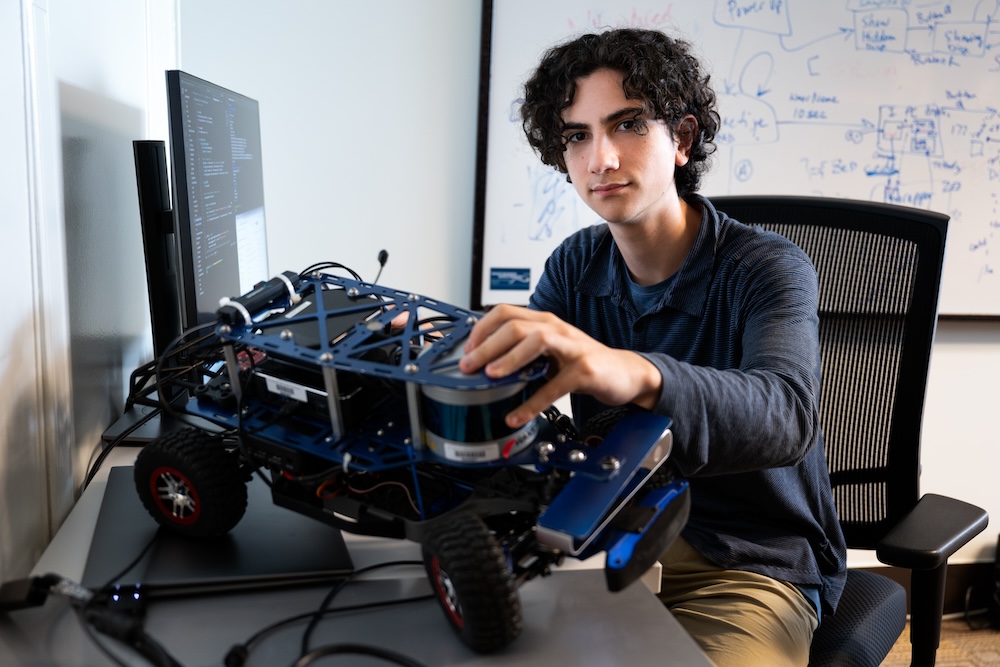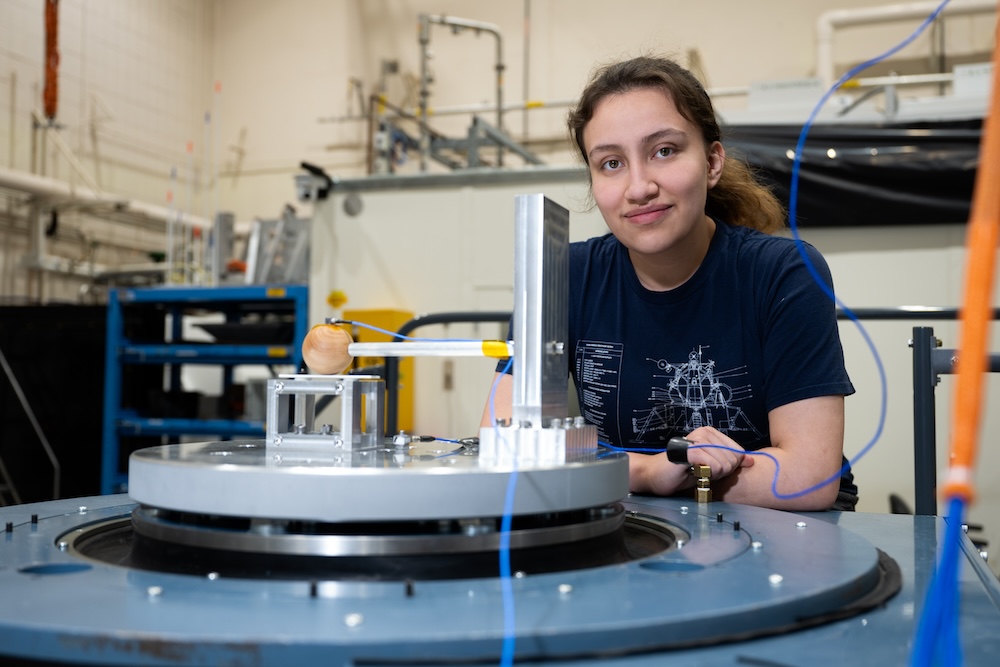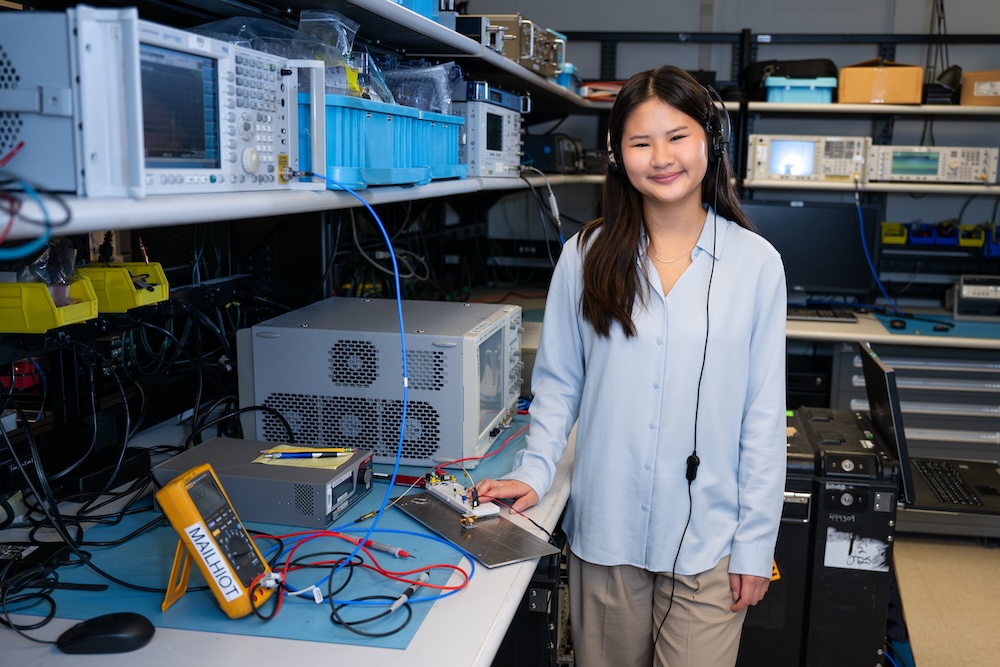Three students participate in the Laboratory’s annual High School Internship Program

In 2022, the Laboratory expanded its internship program to provide high school students with an opportunity to work with staff on projects and explore careers in science, technology, engineering, and mathematics (STEM). Three students participated in the 2024 Summer High School Internship Program and worked with mentors in the Advanced Concepts and Technologies Group, Fabrication Engineering Group, and Control and Autonomous Systems Engineering Group. Communications and Community Outreach Office staff members Chiamaka Agbasi-Porter, the manager of STEM education programs, and Daphne Maldonado, the STEM assistant program manager, coordinated this year's program with Cheryl Bartolone, the talent programs administrator of the Human Resources Department.
"The Summer High School Internship Program provides a unique opportunity for rising seniors who live and attend high school in the New England area to experience and explore STEM careers before committing to an area of study in college," Bartolone said. "During the summer, local high school students are paired with Laboratory staff mentors to complete projects, solve problems, and learn and apply crucial technical and interpersonal skills in a hands-on, professional environment. This internship program helps create a strong pipeline for hiring top talent to support the mission at the Laboratory."
The 2024 program began on July 10 and concluded on August 16, and the interns were encouraged to present their project work at the culmination of the internship.
Drew Michaeli

Drew Michaeli's interest in engineering began in middle school when he joined a For Inspiration and Recognition of Science and Technology (FIRST) robotics team. His passion continued throughout high school, prompting him to join an engineering club and pursue programming projects. He applied to the Laboratory's High School Internship Program after researching opportunities to gain experience in engineering and mentorship in starting a professional career. While at the Laboratory, Michaeli worked to program autonomous racecars with Trevor Ashley, assistant group leader of the Control and Autonomous Systems Engineering Group, as his mentor.
"Recently, our group hosted the RACECAR Technical Education (Tech Ed) course," Ashley said. "This course teaches the fundamentals of robotics through the theme of autonomous driving, and at its culmination students create and demonstrate algorithms that autonomously drive a small car through a racetrack. Drew was tasked with going through our lectures and laboratory instructions and providing feedback on clarity. With the help of Nathaniel Belles of the Control and Autonomous Systems Engineering Group, Drew was able to autonomously drive the racecar around the track using advanced techniques like simultaneous localization and mapping, and pure pursuit. Overall, Drew learned some fundamental concepts in robotics that will hopefully give him an edge in his career."
In addition to the technical aspect of his internship, Michaeli found the networking opportunities to be just as beneficial. During his time at the Laboratory, he connected with fellow students who shared his passion for engineering and met Laboratory staff who provided him with advice about beginning a career in engineering.
"Going into the summer, I knew I wanted to study STEM, but was unsure which degree," Michaeli said. "After exploring different realms of technology and garnering insights from my mentors, I now realize that I want to go into computer engineering. Additionally, I enjoyed my work so much that I am doing research in a similar area this fall."
Mellanie Rodriguez

Mellanie Rodriguez spent the summer working with Bethany Rose Lettiere, a technical staff member in the Fabrication Engineering Group, to create an auditory demonstration that shows how systems with different masses produce different natural frequencies.
"Being in the Laboratory was not something I thought possible before I went to college, and I'm incredibly grateful for the people who gave me the chance to spend part of my summer in such an amazing place," Rodriguez said. "What brought me to the Laboratory was the fact that this experience seemed like it would help me strengthen my skills in communication, physics, engineering and design, and leadership. Working for a place that focuses on national security seemed intimidating, but at the Laboratory I found the opposite; this place is full of enthusiastic and very friendly people."
As a mentor, Lettiere found the program to be equally rewarding, and they encourage staff from all divisions to take part.
"This mentor experience is unique from my typical experiences as a mentor because my mentee is in high school, not university or elementary school," Lettiere said. "She is approaching the significant next step of applying to college and considering what to major in. I worked to provide her with something I wished I had prior to college: an opportunity to see the different fields of engineering at the Laboratory. This gives her the opportunity to hear about different folks' backgrounds and what their career journey looked like—learning a lot about my colleagues in the process!"
Anna Wang

Anna Wang came into her internship with an interest in math, computer science, and neurology. With this in mind, her mentor, Kristan Tuttle, a technical staff member in the Advanced Concepts and Technologies Group, based her internship work around real signals and how they can be created, communicated, and measured.
"I designed and built an astable multivibrator circuit and a filter that produces a 700-hertz frequency using LTSpice and MATLAB," Wang said. "When mounted to a plate with a mixer, the signal is sent and received through antennas in which Morse code can be communicated."
For Wang, this internship not only solidified her career interests, but also expanded her professional goals.
"I've been interested in majoring in computer science and neuroscience/psychology," said Wang. "However, after these six weeks, I realized that I want to incorporate engineering into my studies as well. Not only are there more hands-on experiments, but also, I can delve more into my love for math applicable for solving real-world problems. Therefore, I plan to pursue a major that combines all three of these interests, such as neuroengineering."
As a mentor, Tuttle appreciated how this experience improved her skills as a communicator and the positive experience this opportunity affords the mentees.
"These students, some of whom have never experienced a 40-hour work week before, adjust very well to the schedule, work hard to complete their project, and then present it," Tuttle said. "It's only a six-week period that has so much impact and benefit to the student, mentor, and the people they meet in the Laboratory."
Mentor Reflections
A large part of the mentors' motivation to accept a mentee for the summer stemmed from their own experiences with mentorship in the early stages of their career, and the desire to pay forward the guidance they received and benefited from.
"As a first-generation college graduate, I didn't know what to expect when I started my journey through college," Lettiere said. "Through fantastic friends and mentors, I developed confidence, engineering and research skills, and the ability to navigate through the unknown territory of college applications, what engineering and research truly is, and more. Through mentorship, I hope to pay it forward by providing similar opportunities for the next generation of young scientists and engineers to understand different fields and how to approach problems."
The mentors felt they also benefited from partaking in the program, recognizing the ways mentorship has improved important skillsets required in their own careers.
"I became a mentor because I want to give back the opportunity that I was given as an engineering student, and to broaden [students'] education and opportunities," Tuttle said. "Mentoring has helped challenge me to be a better communicator and break a problem down [so it] can be applied to help or introduce them to STEM. It also provides me insight into how students are learning in the current world."
Ashley also noted how mentors benefit from this program, commenting on the unique opportunity it afforded him to evaluate the RACECAR Tech Ed course and its accessibility to those without an advanced math or science background.
"As an assistant group leader in the Control and Autonomous Systems Engineering Group, I frequently mentor at higher levels—primarily to those with doctorates and master's degrees," he said. "However, I firmly believe that mentoring at lower levels is a much more challenging feat, as it can be difficult to convey—in a simple manner—advanced concepts such as those taught in the RACECAR Tech Ed course. Mentoring at these levels forces us to reframe these concepts in simpler terms, and I believe this helps and even reinforces our own understanding."
Ashley echoed the sentiments of his fellow mentors, sharing how he related to the students' experiences in navigating the start of their professional career, and looks forward to participating in the program again next year.
"Fulfilling the role of a mentor has been one of the most rewarding parts of my career," he said. "When I was in high school, I never had a desire to pursue math or science until a teacher took me under his wing and helped me realize some of my own talents. For many of us, we are (at least in part) a product of our mentors' time and energy. Inspired by and feeling grateful for my mentors, I feel the need to reciprocate the time and energy that was given to me and direct it toward future generations."
To contact the Summer High School Internship Program coordinators, please click here.